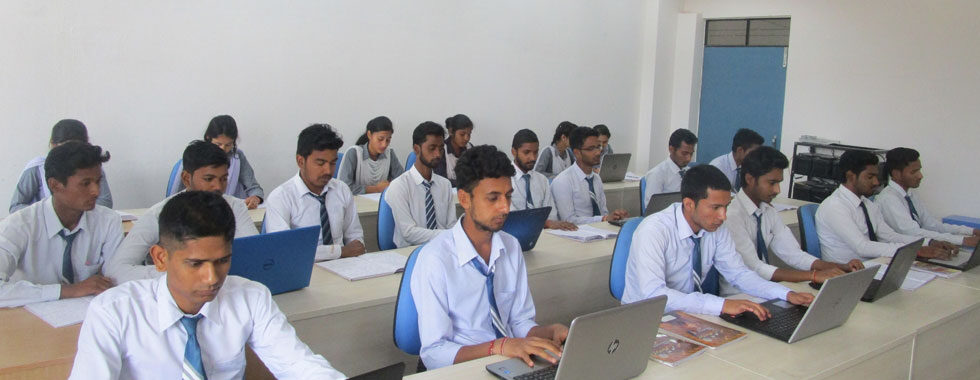Department of Computer Science and Engineering
Vision of Department
To qualify in the field of Computer Science & Engineering through high quality technical education and empower the professionals to serve better to the society.
Mission of Department
- To create innovative technologies in the field of Computer Science & Engineering for building the nation with modern tools and technologies.
- To expose our students to a curriculum consisting of inventive technologies by promoting the skill of continuous learning of emerging new technologies.
- To inculcate the innovative ideas in students and to build them with social responsibilities and ethical values.
Program Outcomes (POs)
- PO1 Basic and Discipline specific knowledge: Apply knowledge of basic mathematics, science and engineering fundamentals and engineering specialization to solve the engineering problems.
- PO2 Problem analysis: Identify and analyze well-defined engineering problems using codified standard methods.
- PO3 Design/ development of solutions: Design solutions for well-defined technical problems and assist with the design of systems components or processes to meet specified needs.
- PO4 Engineering Tools, Experimentation and Testing: Apply modern engineering tools and appropriate technique to conduct standard tests and measurements.
- PO5 Engineering practices for society, sustainability and environment: Apply appropriate technology in context of society, sustainability, environment and ethical practices.
- PO6 Project Management: Use engineering management principles individually, as a team member or a leader to manage projects and effectively communicate about well-defined engineering activities.
- PO7 Life-long learning: Ability to analyze individual needs and engage in updating in the context of technological changes.
Program Specific Outcomes (PSOs)
- PSO1: To design and develop the computational solutions in the areas related to operating systems, computer networks, data structures, multimedia and hardware servicing and applying the knowledge to solve the problems.
- PSO2: To ensure the technical skills for software development using modern tools and technologies.
- PSO3: To use the knowledge in product development accompanying with ethical and entrepreneurial values for the benefit of society.
Program Educational Objectives (PEOs)
At the end of program, the students may be able to,
- PEO 1: Understand and analyze the industrial needs through knowledge gained in Mathematics, Science and Engineering fundamentals.
- PEO 2: Work effectively as Computer Engineers with supportive and leadership roles in multidisciplinary domains.
- PEO 3: Contribute the spirit of teamwork in global platform to pursue the professional career to adopt changes and societal needs.
Diploma in Computer Science Engineering
Computer Science, study of the theory, experimentation, and engineering that form the basis for the design and use of computers—devices that automatically process information. Computer science traces its roots to work done by English mathematician Charles Babbage, who first proposed a programmable mechanical calculator in 1837. Until the advent of electronic digital computers in the 1940s, computer science was not generally distinguished as being separate from mathematics and engineering. Since then it has sprouted numerous branches of research that are unique to the discipline. Early work in the field of computer science during the late 1940s and early 1950s focused on automating the process of making calculations for use in science and engineering. Scientists and engineers developed theoretical models of computation that enabled them to analyze how efficient different approaches were in performing various calculations. Computer science overlapped considerably during this time with the branch of mathematics known as numerical analysis, which examines the accuracy and precision of calculations. Computer scientists continue to expand the frontiers of computer and information systems by pioneering the designs of more complex, reliable, and powerful computers; enabling networks of computers to efficiently exchange vast amounts of information; and seeking ways to make computers behave intelligently. As computers become an increasingly integral part of modern society, computer scientists strive to solve new problems and invent better methods of solving current problems.
Seats
25
Qualification
10+ with Scince and Mathematics
Duration
3 Years
Affiliation
UBTE Roorkee
Syllabus (CSE)(OLD)
SEM- 1st
- English and Communication Skills – I
- Applied Mathematics – I
- Applied Physics – I
- Applied Chemistry – I
- Basics of Information Technology
- Engineering Drawing – I
- General Workshop Practice – I
SEM- 2nd
- English and Communication Skills – II
- Applied Mathematics – II
- Applied Physics – II
- Applied Chemistry – II
- Environmental Science
- Engineering Drawing – II
- General Workshop Practice – II
SEM- 3rd
- PROGRAMMING IN C
- BASICS OF ELECTRICAL AND ELECTRONICS ENGINEERING
- OBJECT ORIENTED CONCEPTS
- COMPUTER SYSTEM PERIPHERALS
- DIGITAL DATA COMMUNICATION
- OPERATING SYSTEMS
SEM- 4th
- DATA STRUCTURES USING C
- WEB TECHNOLOGIES
- COMPUTER ORGANIZATION AND ARCHITECTURE
- DATABASE MANAGEMENT SYSTEM
- SYSTEM AND SOFTWARE ENGINEERING
- COMPUTER NETWORKS
- INDUSTRIAL TRAINING
SEM- 5th
- DATABASE PROGRAMMING
- VISUAL PROGRAMMING WITH C#
- COMPUTER AND NETWORK TROUBLESHOOTING
- CRYPTOGRAPHY AND NETWORK SECURITY
- SOFTWARE QUALITY AND TESTING
- MICROPROCESSOR
- MINOR PROJECT WORK
SEM- 6th
- OBJECT ORIENTED PROGRAMMING USING JAVA
- COMPUTER GRAPHICS
- DATA WAREHOUSE AND MINING
- OPEN SOURCE TECHNOLOGIES
- MOBILE COMPUTING
- ENTREPRENEURSHIP DEVELOPMENT AND MANAGEMENT
- EMPLOYABLE SKILLS
- MAJOR PROJECT WORK
